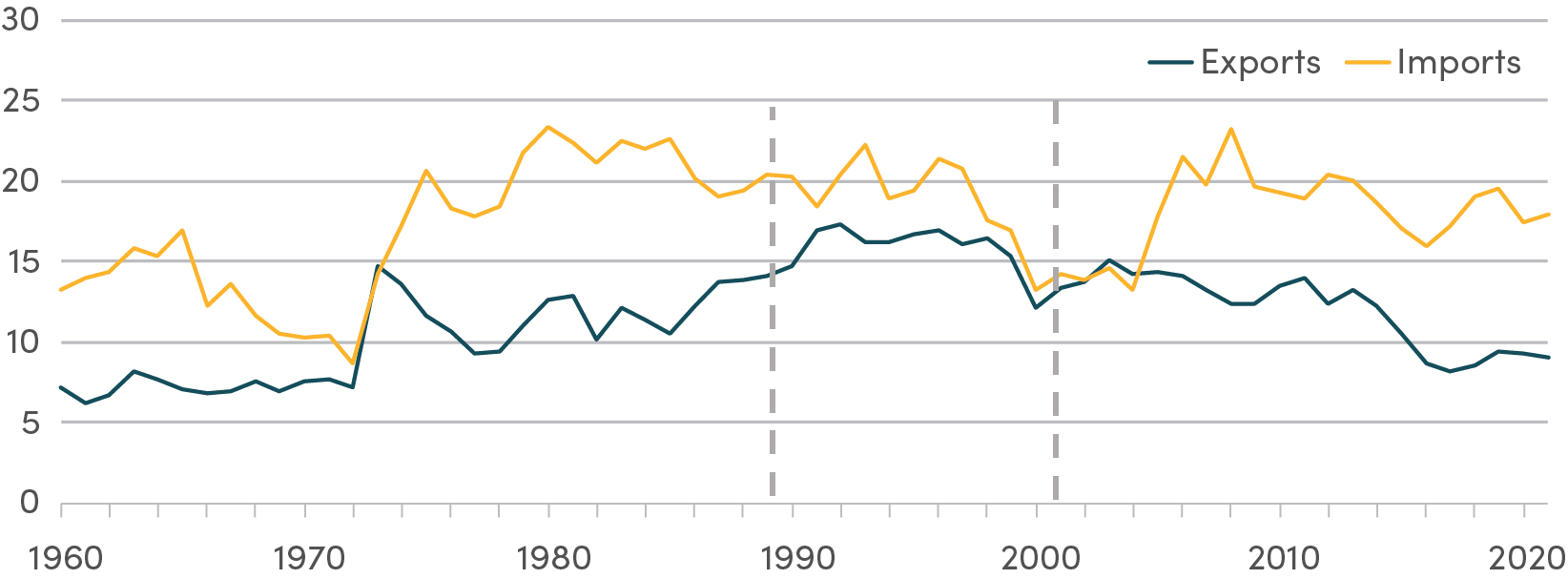People who move from poor countries to rich countries add colossal value to the world economy. They can do this, my research has shown, because their labor is often several times more valuable in the countries they move to. Workers who move, even in modest numbers, can create economic gains in the trillions of dollars, and most of that value accrues to the destination country. On top of that, migrants send so much money to developing countries, it amounts to triple the value of all foreign aid combined, at no cost to rich-country taxpayers.
So why do large minorities of many rich countries oppose more immigration? Some of their concerns can’t be addressed by economists like me, because they’re not economic concerns. John Tanton, who set up an anti-immigrant pressure group called the “Center for Immigration Studies”, has written that ethnically-diverse immigration threatens “Western Civilization” by eroding the “European-American majority”. Racism and ethnocentrism explain substantial fractions of immigration opposition according to some the best research we have—by Anna Maria Mayda , by Christian Dustmann and Ian Preston, and by Jens Hainmueller and Michael Hiscox.
But the same research shows racism is far from the whole story. Many people believe that immigrants take money out of their pockets on tax day, by using more in public services than they pay for in taxes. In survey data these concerns persist even after controlling for racial attitudes. Large majorities of people in major destination countries believe that it’s “important” or “very important” to admit immigrants who “won’t use social benefits”.
Now here’s a question that economic analysis can settle pretty conclusively. Do immigrants typically drain public coffers, or fill them?
This became a hot topic in Washington in May, when the Heritage Foundation released a report claiming that immigrants cost US taxpayers many trillions of dollars. It quickly became clear that the study used shockingly shoddy methods and that one of the authors believed that non-white immigration should be restricted because some non-whites have lower IQs than whites. Soon afterwards that author, um, “resigned”, and Heritage mostly stopped promoting the report.
It’s good when bad ideas get chucked in the trash where they belong. But that still leaves us with the question: What is the impact of immigration on public coffers?
Finally some adults have stepped in to answer this question. The OECD has conducted an unprecedented and comprehensive analysis of the fiscal impact of immigrants across 28 countries, including the United States. First, the study shows that anti-immigration attitudes are closely linked to whether people believe that immigrants fill public coffers, or drain them:
People with different opinions have different views of the facts. Analysts can settle facts. People who support more immigration from poorer countries think immigrants make a net positive fiscal contribution, and people who have the opposite opinion believe the opposite fact. Who is right?
The OECD analysis proceeds to calculate the true “net direct fiscal position” impact of immigrants, using the world’s best data harmonized across most OECD countries. The net direct fiscal position equals the taxes and social security contributions of immigrants minus the social transfers they receive. In the figure below, the vertical axis shows this net direct fiscal position for an average household. A positive number means they pay more in taxes than they use in benefits. The blue bars are immigrant-headed households, the white diamonds are native-headed households.
In the United States, the OECD finds that the fiscal impact of the average native household and the average immigrant household are similar and positive. The average immigrant household makes a positive contribution equivalent to more than 8,000 Euros per year (around US$11,000) more in taxes than they take out in benefits.
This impact is “direct” because it only counts current cashflows into and out of the public purse. Such an estimate is conservatively low because, the OECD notes, it “neglects the indirect implications resulting from migrants’ broader impact on the economy”. Other analyses show that including these broader economic stimulus effects raises the fiscal impact of US immigration, such as a recent peer-reviewed academic study by Chojnicki, Docquier, and Ragot. It is furthermore conservatively low because it omits the fiscal impact of US immigrants’ children, which is known to be positive and large.
The impacts above exclude the cost of schooling for young children. That is a correct omission. Taxpayers like me do not finance schooling for other families’ children because we enjoy giving cash for other people to blow on frivolous lifestyle consumption. We finance public schooling because in a society where today’s adults got education when they were children, everything is better—including the economy. Educating the next generation is not financing the consumption of others, it’s an investment in the nation, an investment with positive returns. Beyond this, it would be nonsensical to compare schooling usage by non-migrants and migrants. Non-migrants tend to be much older on average than typically young migrant families. Across the entire United States, elderly Americans’ property taxes finance public schooling for other American families’ young children, even though elderly Americans’ kids left school long ago. I’ve never heard a nativist politician calling for an end to those subsidies on the grounds that young American families are “consuming” the money of the elderly. Public money that is spent educating the next generation of Americans—whether those Americans’ parents were born here or elsewhere, has positive returns for society. Education is an investment.
The lead researcher behind the OECD analysis is the brilliant migration expert Jean-Christophe Dumont. He summarizes the findings over on the People Move blog:
“Immigrants are thus neither a burden to the public purse nor are they a panacea for addressing fiscal challenges. They have a positive net direct fiscal position in most countries, except in those with a large share of older migrants. … Contrary to public belief, low-educated immigrants have a better fiscal position than their native-born peers. And where immigrants have a less favorable fiscal position, this is not driven by a greater dependence on social benefits, but rather by the fact that they often have lower wages and thus tend to contribute less.
“Most immigrants do not come for social benefits, they come to find work and to improve their lives and those of their families. Indeed, employment is the single most important determinant of migrants’ net fiscal contribution and raising immigrants’ employment rate to that of the native born would result in substantial fiscal gains, notably in European OECD countries. Efforts to better integrating immigrants should thus be seen as an investment rather than a cost.”
This could not be clearer. Immigration bolsters the public purse, though not enough to offset the fiscal challenges associated with aging societies.
This OECD study is the last nail in the coffin for nativists’ cooked-up narratives about benefits use by immigrants. No one has better data on this than the OECD. The study concludes, “Overall, there seem to be few differences between the benefit receipt of immigrant and native-born households”.
Now that we have the facts, will this change the minds of immigration skeptics who say that their chief concern is fiscal impact? I have a deathless faith that facts and evidence matter, but in this debate, the best we can hope for is that they’ll nudge the needle a couple of ticks.
Disclaimer
CGD blog posts reflect the views of the authors, drawing on prior research and experience in their areas of expertise. CGD is a nonpartisan, independent organization and does not take institutional positions.





